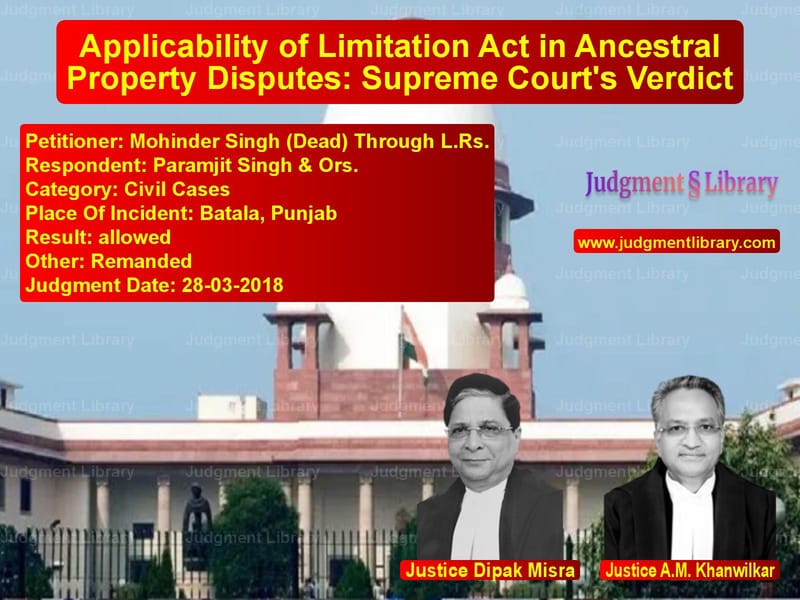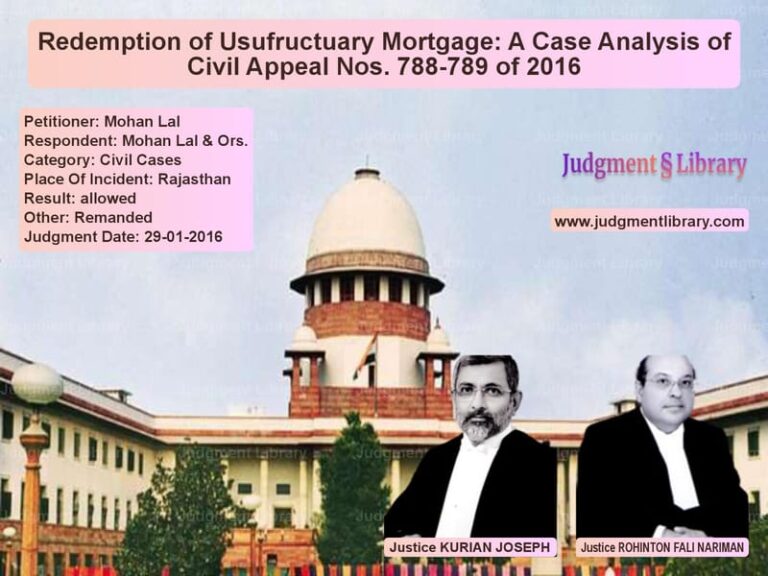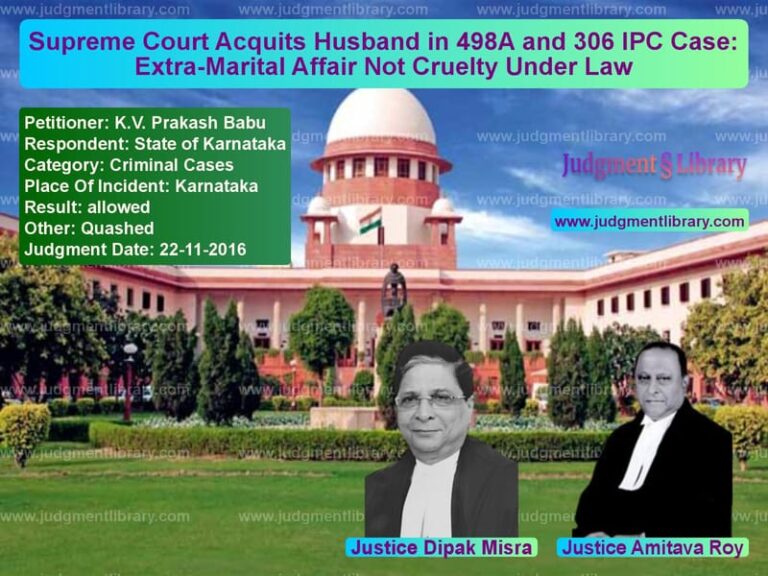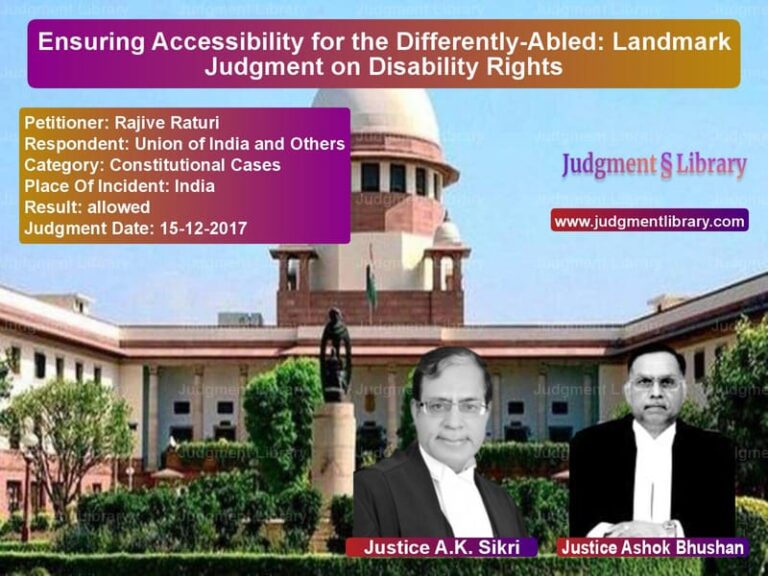Applicability of Limitation Act in Ancestral Property Disputes: Supreme Court’s Verdict
The Supreme Court of India, in the case of Mohinder Singh (Dead) Through L.Rs. v. Paramjit Singh & Ors., examined a crucial issue concerning the applicability of Section 14 of the Limitation Act, 1963, in cases governed by the Punjab Limitation (Custom) Act, 1920. The ruling emphasized the importance of proper interpretation of limitation periods in property disputes involving ancestral lands and declared sales.
Background of the Case
The dispute arose from a gift deed executed by one Ujjagar Singh on March 6, 1963, in favor of Rura Singh. The land in question was ancestral property, and Mohinder Singh, the predecessor of the appellants, contested the gift as being void. Consequently, he filed a suit for declaration, which was settled through a compromise on August 20, 1963. The compromise recognized Mohinder Singh’s right to the disputed land after the death of Ujjagar Singh.
Key Events
- Ujjagar Singh passed away on January 14, 1971.
- Mohinder Singh filed an execution petition on February 18, 1971, to enforce the decree.
- The execution petition was dismissed, prompting him to file a fresh suit for possession on June 11, 1974.
- The defendants contended that the suit was barred by limitation.
Legal Issues Before the Supreme Court
The primary question before the Supreme Court was whether the time spent in pursuing the execution proceedings could be excluded while computing the limitation period under the Punjab Limitation (Custom) Act, 1920, in light of Section 14 of the Limitation Act, 1963.
Arguments of the Parties
Petitioner’s (Mohinder Singh’s LRs) Arguments
- The time spent in execution proceedings should be excluded under Section 14 of the Limitation Act, 1963.
- The limitation period should start from the date when the declaratory decree was obtained, which was August 19, 1972, when the decree sheet was drawn.
- The execution petitions were pursued in good faith and were dismissed due to procedural reasons rather than substantive defects.
Respondent’s (Paramjit Singh & Ors.) Arguments
- The limitation period should start from January 14, 1971 (the date of Ujjagar Singh’s death) and not from the decree sheet’s preparation.
- Under Article 2(b) of the Punjab Limitation (Custom) Act, 1920, the suit for possession should have been filed within three years of Ujjagar Singh’s death.
- The decree drawn on August 19, 1972, should relate back to August 20, 1963, when the declaratory decree was passed.
Supreme Court’s Analysis and Judgment
The Supreme Court bench comprising Chief Justice Dipak Misra and Justice A.M. Khanwilkar overturned the Punjab and Haryana High Court’s ruling, restoring the trial court and first appellate court’s decisions.
1. Interpretation of ‘Obtaining a Declaratory Decree’
The Supreme Court interpreted Article 2(b) of the Punjab Limitation (Custom) Act, 1920, and clarified that the term “obtaining a declaratory decree” means when the decree is drawn, not merely when the judgment is passed.
“The legislature in enacting the 1920 Act consciously used the expression ‘the declaratory decree is obtained,’ which intrinsically includes the date on which a formal decree is drawn or prepared and not merely the date on which a declaratory judgment is passed.”
The Court found that the decree sheet was prepared only on August 19, 1972, making the suit for possession filed on June 11, 1974, well within the limitation period of three years.
2. Applicability of Section 14 of the Limitation Act, 1963
The Supreme Court held that Section 14 of the Limitation Act, 1963, which allows the exclusion of time spent in pursuing remedies in good faith, applied in this case because:
- The execution proceedings were civil proceedings pursued in good faith.
- The petitioner was under the bona fide belief that possession could be obtained through execution.
- The execution petitions were dismissed due to procedural reasons, which constituted a “defect of jurisdiction or other cause of a like nature.”
“Section 14 of the Limitation Act is wide enough to cover such cases where the defects are not merely jurisdictional strictly so-called but others more or less neighbors to such deficiencies.”
The Court ruled that the limitation period should exclude the time spent in execution proceedings, thus making the possession suit timely.
Final Judgment
The Supreme Court set aside the Punjab and Haryana High Court’s judgment and restored the decisions of the trial court and the first appellate court. The key rulings included:
- The possession suit was not barred by limitation.
- The limitation period should be counted from the date of decree sheet preparation, not the date of declaratory judgment.
- Time spent in execution proceedings should be excluded under Section 14 of the Limitation Act.
- The petitioners were entitled to possession of the ancestral land as per the compromise decree.
Impact of the Judgment
This ruling provides a significant precedent for property disputes where declaratory decrees are involved. Key takeaways include:
- Clarification on limitation periods: The date of decree sheet preparation is critical for computing limitation.
- Protection under Section 14 of the Limitation Act: Litigants pursuing execution remedies in good faith can exclude the time spent.
- Judicial consistency: Courts must ensure procedural fairness while computing limitation periods to avoid unjust dismissals.
Conclusion
The Supreme Court’s judgment in Mohinder Singh (Dead) Through L.Rs. v. Paramjit Singh & Ors. reinforces the importance of interpreting limitation laws to ensure justice is not denied due to procedural technicalities. By upholding the suit’s validity and setting aside the High Court’s ruling, the Court has provided clarity on the application of limitation laws in property disputes.
Petitioner Name: Mohinder Singh (Dead) Through L.Rs.Respondent Name: Paramjit Singh & Ors.Judgment By: Justice Dipak Misra, Justice A.M. KhanwilkarPlace Of Incident: Batala, PunjabJudgment Date: 28-03-2018
Don’t miss out on the full details! Download the complete judgment in PDF format below and gain valuable insights instantly!
Download Judgment: Mohinder Singh (Dead vs Paramjit Singh & Ors Supreme Court of India Judgment Dated 28-03-2018.pdf
Direct Downlaod Judgment: Direct downlaod this Judgment
See all petitions in Property Disputes
See all petitions in Specific Performance
See all petitions in Damages and Compensation
See all petitions in Judgment by Dipak Misra
See all petitions in Judgment by A M Khanwilkar
See all petitions in allowed
See all petitions in Remanded
See all petitions in supreme court of India judgments March 2018
See all petitions in 2018 judgments
See all posts in Civil Cases Category
See all allowed petitions in Civil Cases Category
See all Dismissed petitions in Civil Cases Category
See all partially allowed petitions in Civil Cases Category







